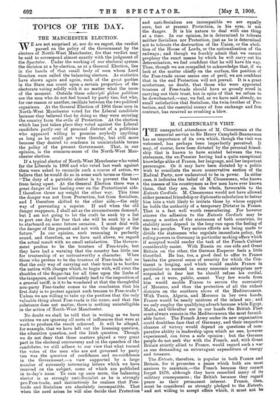TOPICS OF THE DAY.
THE MANCHESTER ELECTION.
E are not surprised at, nor do we regret, the verdict passed on the policy of the Government by the electors of North-West Manchester, for that verdict may be said to correspond almost exactly with the judgment of the Spectator. . Under the working of our electoral system the decision at a by-election, as at a General Election, lies in the hands of that small body of men whom Lord Goschen once called the balancing electors. As statistics have shown again and again, each of the great parties in the State can count upon a certain proportion of the electorate voting solidly with it no matter, what the issue Of the moment. Outside these adscripti glebae politicae are the men who do not feel bound by party ties, but who, for one reason or another, oscillate between the two political organisms. At the General Election of 1906 these men in North-West Manchester voted for the Liberal candidate beeause they believed that by doing so they were securing tile country from the evils of Protection. At the election which has lust taken place they voted against the Liberal candidate partly out of personal distrust of a politician who appeared willing to promise anybody anything as long as he could get votes thereby, but still more because they desired to condemn in unmistakable terms the policy of the present Government. That, in our opinion, is the common-sense of the North-West Man- chester election.
If a typical elector of North-West Manchester who voted for the Liberals in 1906 and who voted last week against them were asked to reconcile such a course of action, we believe that he would do so in some such terms as these :— "The duty of a patriotic elector is to prevent the boat from being upset. At the General Election there was a great danger of her heeling over on the Protectionist side. I.therefore threw my weight the other way. This time the danger was not from Protection, but from Socialism, and I therefore shifted to the other side,—the only way of preventing a capsize. If and when the old danger reappears, I shill act as the circumstances demand; but I am not going to let the craft be sunk by a list to port one day for fear that she will be sunk by a list to starboard on some future occasion. I must deal with the danger of the present and not with the danger of the future." In our opinion, such reasoning is perfectly sound, and therefore, as we have said above, we regard the actual result with no small satisfaction. The Govern- ment profess to be the trustees of Free-trade, but they have had a warning that the country has little use for trusteeship of so untrustworthy a character. When those who profess to be the trustees of Free-trade tell us that the only way of carrying out their trust is to burden the nation with charges which, to begin with, will rivet the shackles of the Sugar-tax for all time upon the limbs of the taxpayers, and must ultimately lead to the imposition of a general tariff, is it to be wondered at that the thoughtful non-party Free-trader comes to the conclusion that his first duty is to protest against such treason to Free-trade ? Unless we are willing to take up the position that the only valuable thing about Free-trade is the name, and that the substance does not matter, there is nothing unintelligible in the action of North-West Manchester.
No doubt we shall be told that in writing as we have written we are ignoring all sorts of influences that were at work to produce the result achieved. It will be alleged, for example, that we have left out the licensing question, the education question, and the Irish question. Though we do not deny that these matters played a very great part in the electoral controversy and in the speeches of the candidates, we still adhere to our view that what turned the votes of the men. who are not governed by party ties was the question of confidence and no-confidence in the Government,—a view supported by a. large number of extremely interesting letters which we have received on the _subject, some of which are published in to-day's issue. To sum up once more, the balancing elector is as strongly anti-Socialist as he is strongly pro-Free-trade, and instinctively lie realises that Free- trade and Socialism are absolutely incompatible..' That when the need arises he will also decide that Protection and anti-Socialism are incompatible we are equally sure, but at present Protection, in his eyes, is not the danger. It is his nature to deal with one thing at a time. In our opinion, he is determined to tolerate neither Socialism nor Protection, just as be is determined not to tolerate the destruction of the Union, or the aboli- tion of the House of Lords, or the nationalisation of the railways ; and though we frankly admit that we cannot prophesy the exact means by which he will carry out his determination, we feel confident that he will have his way. Thus, though we are compelled to acknowledge that, if, we look at the matter chiefly on the surface, the position of the Free-trade cause seems one of peril, we are confident that in the end Protection will not prevail. It is a great misfortune, no doubt, that those who were appointed trustees of Free-trade should have so grossly erred in carrying out their trust, but in spite of that we refuse to be downhearted,—nay, we feel, as we have said already, no small satisfaction that Socialism, the twin-brother of Pro- tection, and the essential enemy of free exchange and free contract, has received so crushing a blow.








































 Previous page
Previous page